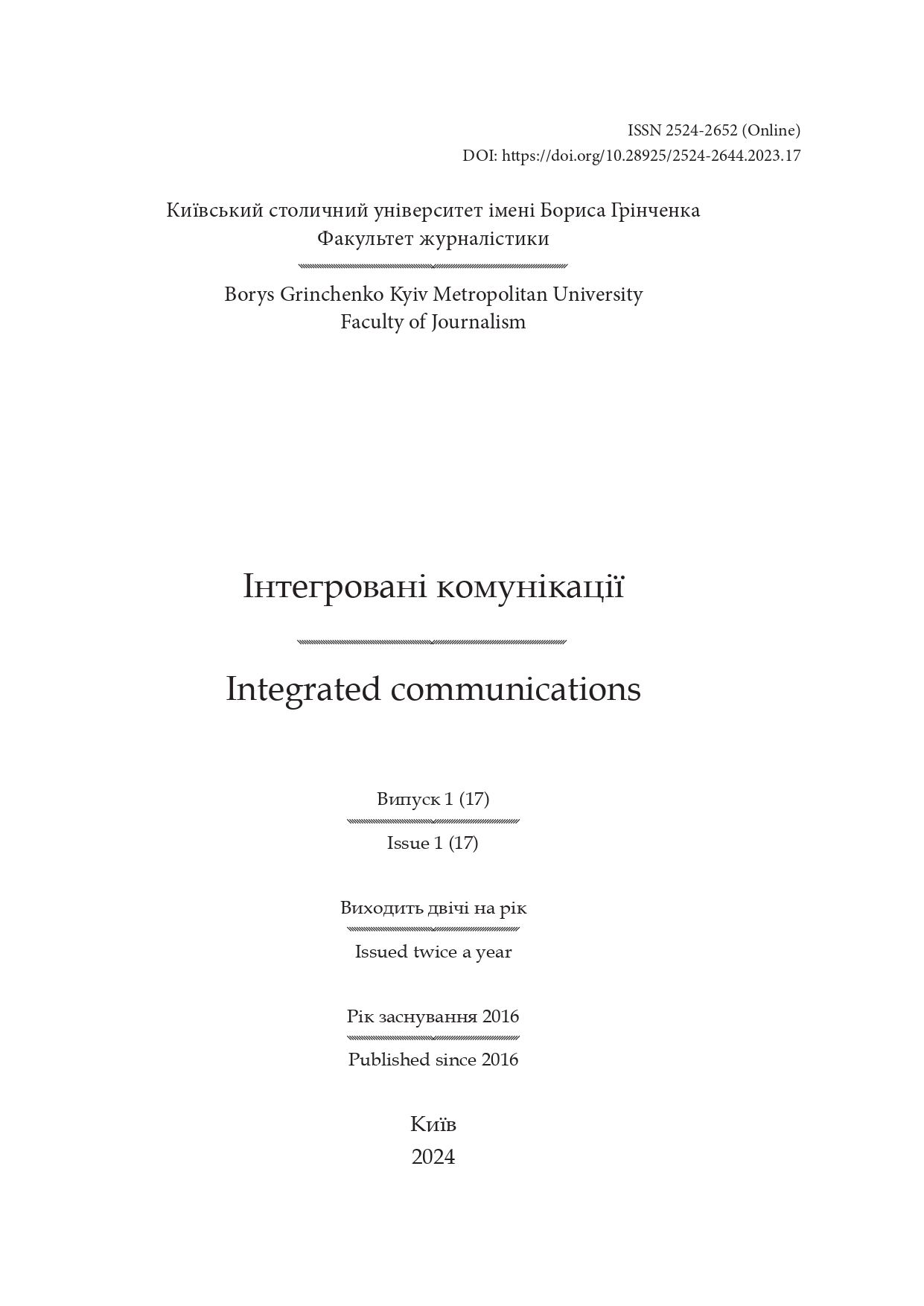EDUCATION FOR SUSTAINABLE DEVELOPMENT: MEDIA DIMENSION OF THE ISSUE
Abstract
The article analyses the role of mass media as an educational tool in promoting sustainable development in the context of the UN Sustainable Development Goals. The relevance of this direction of research is due to the fact that the media can play (and do play) a key role in promoting the ideas of sustainable development, which can be proven in terms of the agenda-setting theory: mass communication means, paying more or less attention to certain problems, shape in public understanding of their importance. Accordingly, by focusing attention on issues of sustainable development, the mass media can «root» the understanding of the relevance of these issues. Framing can be a tool for such rooting. The purpose of the study is to identify the role of mass media as an educational tool in promoting sustainable development in the context of the UN Sustainable Development Goals. To achieve this goal, the tasks were set to characterize the place of education in ensuring sustainable development and outline and systematize existing practices of engaging media potential as an educational tool to achieve Sustainable development goals. The implementation of these tasks made it possible to find out that, firstly, education occupies an important place among the components of the social pillar of sustainable development, which is confirmed by the presence of relevant elements in the visions of sustainable development by the UN, OECD, etc. Secondly, the existing practices of engaging the media potential as an educational tool in the context of achieving Sustainable development goals can be grouped into two clusters: engaging the media as tools for promoting the ideas of sustainable development, shaping among people’s understanding of the importance of sustainability as a guarantee of meeting urgent needs as of today, as well as ensuring the possibility of meeting needs of next generations; media themselves act as translators of ideas and concepts consistent with the Sustainable Development Goals for target audiences in developing countries (such practices are implemented primarily by international broadcasting systems of leading actors of international relations as well as by community media).
Downloads
References
Bird, E., Lutz, R., Warwick, Ch. (2008). Media as partners in education for sustainable development: A Training and Resource Kit. United Nations Educational, Scientific and Cultural Organization, Paris (France).
Bodt, T. (2007). Role of the Media in Achieving a Sustainable Society. In: Dorji, Kinley, (ed.), Media and public culture : proceedings of the Second International Seminar on Bhutan Studies. Thimphu: Center for Bhutan Studies, 459-501. Avaible at: https://www.bhutanstudies.org.bt/media-and-public-culture (accessed 22.04.2024).
DW (2012). Learning by Ear. Deutsche Welle. Avaible at: https://www.dw.com/en/learning-by-ear/a-15841898 (accessed 29.04.2024).
DW (2013). Multimedia content in 30 languages. Deutsche Welle. Avaible at: https://corporate.dw.com/en/multimedia-content-in-30-languages/a-15703976 (accessed 28.04.2024).
Entman, R. M. (1993). Framing: toward clarification of a fractured paradigm. Journal of Communication, 43(4), 51– 58. https://doi.org/10.1111/j.1460-2466.1993.tb01304.x
IUCN (1980). World conservation strategy. Living resource conservation for sustainable development. International Union for Conservation of Nature and Natural Resources, Gland (Switzerland).
Kulik, R. M. (2024). sustainable development. Encyclopædia Britannica. Avaible at: https://www.britannica.com/topic/sustainable-development
Myers, M. (2011). Voices from Villages: Community Radio in the Developing World. A Report to the Center for International Media Assistance. Retrieved Avaible at: https://www.cima.ned.org/wp-content/uploads/2015/02/CIMA-Community_Radio-Report_Final%20-%2006-30-11.pdf (accessed 20.04.2024).
Nishimura, Y. (2020). How the media can be a meaningful stakeholder in the quest to meet the SDGs. World Economic Forum Annual Meeting. Retrieved Avaible at: https://www.weforum.org/agenda/2020/01/sdgs-sustainable-development-news-media-coverage (accessed 20.04.2024).
OECD (1996). Shaping the 21st Century: The Contribution of Development Co-operation. Paris: OECD. https://doi.org/10.1787/d571f17c-en
Połońska-Kimunguyi, E. (2015). From public service broadcaster to development actor: Deutsche Welle and the (con)quest of African female audiences. Critical Arts 29(3), 382-399. https://doi.org/10.1080/02560046.2015.1059554
Sarmah, Bh., Lama, S. (2017). Radio as an Educational Tool in Developing Countries: Its Evolution and Current Usages. In: International Conference on Developmental Interventions and Open Learning for Empowering and Transforming Society (13-15 December, 2017). Krishna Kanta Handiqui State Open University, 329-344. Avaible at: http://dlkkhsou.inflibnet.ac.in:8080/jspui/handle/123456789/321 (accessed 20.04.2024).
UN (1995). Copenhagen Declaration on Social Deve- lopment. Avaible at: https://www.un.org/en/development/desa/population/migration/generalas-sembly/docs/globalcompact/A_CONF.166_9_Declaration.pdf (accessed 22.04.2024).
UN (n.d.) SDG Media Compact. Avaible at: https://www.un.org/sustainabledevelopment/sdg-media-compact-about (accessed 29.04.2024).
UN (2015). Transforming our world: the 2030 Agenda for Sustainable Avaible at: https://sdgs.un.org/sites/default/files/publications/21252030%20Age-nda%20for%20Sustainable%20Development%20web.pdf (accessed 28.04.2024).
UNESCO (2019). Education transforms lives: Empowering people and ensuring inclusiveness and equality. United Nations Educational, Scientific and Cultural Organization, Paris (France).
UNESCO (n.d.). Community Media. Avaible at: https://www.unesco.org/en/media-pluralism-diversity/com-munity-media (accessed 29.04.2024).




